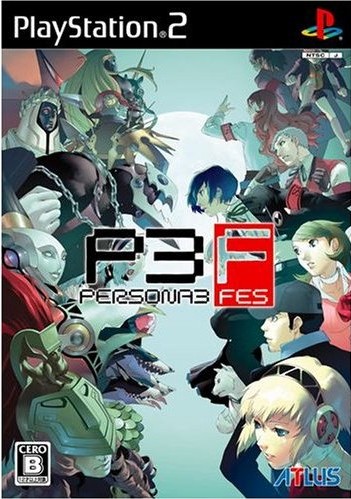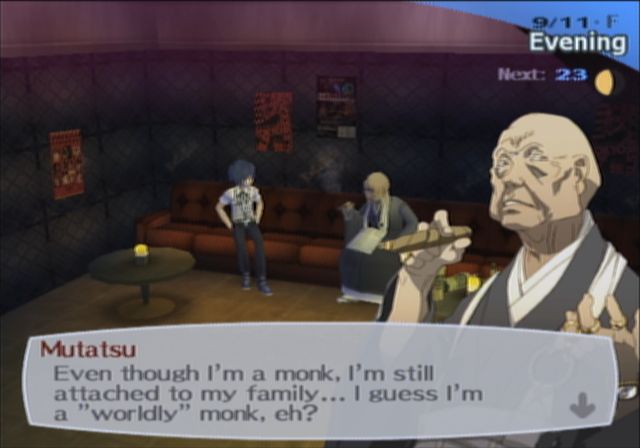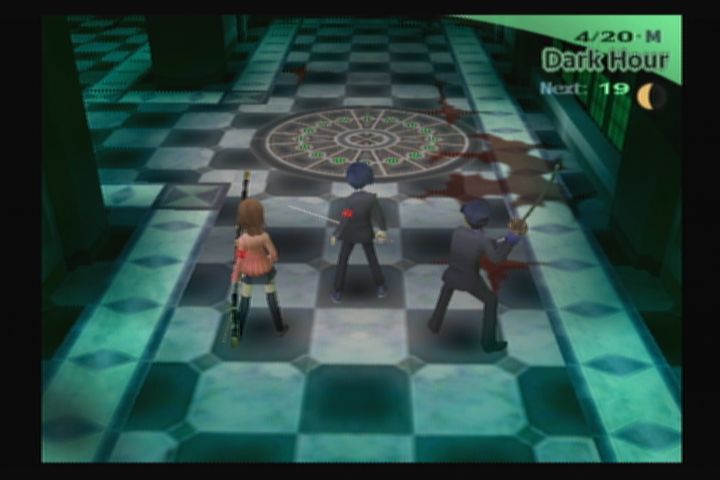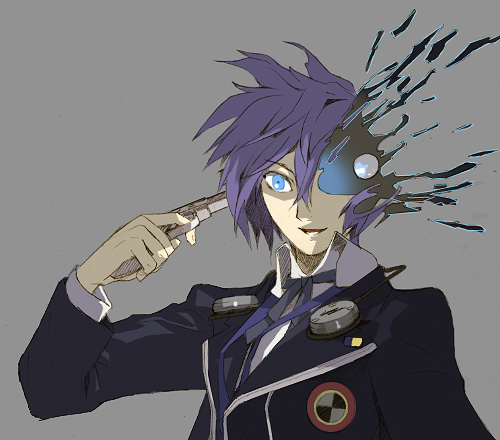
Persona 3 FES (2008)
Platform: PS2
Genre: Role-Playing (JRPG), Sim
Single-player
Developer: Atlus
Platform: PS2
Genre: Role-Playing (JRPG), Sim
Single-player
Developer: Atlus
For me, Japanese RPGs are a genre that I've always felt comfortable with. I like anime-styled graphics, turn-based combat and don't mind the occasional spiky-haired angst-ridden hero. On the other hand, I've never been seduced by simulation games of any kind. I've never really felt the need to live another life within a game, guiding a virtual avatar of me to work at a dream job and making mad, passionate, pixelated love to everyone and anyone. That said, Persona 3 is one of two games (the other being its sequel) that manage to combine both genres to create an engaging world in which I actively try to get on with everyone as well as slogging through dungeons, murdering everything between me and the plot.
Persona 3 FES comes courtesy of Atlus and is part of the Persona sub-series in the Shin Megami Tensei conglomerate. The game follows the efforts of a team of (mostly) teenagers who have the ability to summon a Persona - a physical manifestation of their personality that takes the form of a monster, often from mythology or religion. This team has to use this ability in order to combat Shadows - evil creatures that emerge during the Dark Hour, a hidden hour beginning at midnight.

Believe it or not, this guy's on your side
Yeah, you shoot yourself to summon monsters. As far as I know, that generated a fair amount of controversy, but it looks damn cool, and that?s what matters.
The gameplay then splits into two distinct halves: during the day, you guide the Protagonist through his days at high school, answering questions from teachers, listening to lectures and snoozing in class. At night, you have the option of visiting Tartarus, making your way up its many levels and defeating Shadows to become stronger.

Also featuring an effeminate French kid and a transvestite
Having said that, some characters can come across as a tad flat. For example, in your team Junpei comes with "I wish I was the Hero" angst which can make him completely insufferable. Thankfully, Atlus seems to know this, because they?ve made him all but useless in combat as well, so you?ll only have to listen to him whine whenever the plot comes back around. Most of the characters do have some faults but for the most part they are endearing despite this. Some Social Links suffer from a similar problem, whether it's having to endure the incredibly creepy kid talk to you about his fetish for his teacher or having to sit through painfully embarrassing dates with Elizabeth, Igor's assistant from the Velvet Room who knows nothing of human culture.
During the Dark Hour is where the game's RPG elements come to the fore. Each night you can elect to explore Tartarus, which consists of several blocks, all of which must be beaten before the game's ending. Each block has its own distinct style, from the blood-stained school hallways of the first layer, Thebel, to the trippy, psychedelic appearance of Harabah. These changing designs help give Tartarus a creepy atmosphere, and contrast spectacularly with the colourful world outside. Similarly, the music outside is often styled on bouncy J-Pop, whereas in Tartarus you find yourself listening to deep and sombre music that sometimes features broken or discordant sounds in order to further reinforce the alien nature of the tower.
However, the exploration of Tartarus is where a few of the game's biggest faults lies. As you climb the levels of the tower, you must confront the Shadows inhabiting it. Encounters in Tartarus are not random, thankfully, and are instead initiated in the overworld by attacking the Shadows. During combat, which is turn-based, you take control of the Protagonist and issue commands to him. Then, you must rely on the AI to make effective choices regarding the moves of your allies in battle.
Hah. No such luck. In a game series which prides itself on difficult encounters (and this one is no different), taking away the player's biggest advantage over the computer is a poor decision which only leads to exacerbation. You can give your allies suggestions but such choices are ineffective at best and a total waste of time at worst, particularly when it leads to your allies wasting their MP on useless Buffs or Debuffs, or Attacks to which to the enemy is immune.

Great atmosphere and sound, but there's about 20 floors of this
Despite that, the bosses tend to be quite inventive in their design, as do the Shadows, and the lead up to the final fights is as intense as you could hope for, and culminates in the sort of fight that the word "epic" can correctly be used to describe. The ending is also heartbreaking, as well as full of hope, and feels like the end of a truly incredible and cathartic quest.
However, this is about Persona 3 FES, which means there's more. FES was a re-release of the main game, and, as such, features extra content. Some of it is simply Persona changes and means little to me as I didn?t play the original. However, the main draw is the extra quest, The Answer, which takes place after the ending of Persona 3. Unfortunately, while The Answer does offer around an extra 30-odd hours of gameplay, said gameplay is the dungeon-crawling and grind half, and not the Social Link Life Sim stuff that makes Persona 3 unique. Ultimately, while it offers a continuation of the story of Persona 3, it feels slightly unnecessary at times, and a little poorly-written in comparison to the main story. It's a fine addition, but not necessarily a "must-buy" feature of FES.
PROs
- Fantastic story
- Well-written and engaging characters
- Brilliant atmosphere
- Corking soundtrack
- Crisp, anime-styled graphics
- Coolest way of summoning ever
- Fantastic story
- Well-written and engaging characters
- Brilliant atmosphere
- Corking soundtrack
- Crisp, anime-styled graphics
- Coolest way of summoning ever
CONs
- Grindfest
- AI controlled allies
- A few irritating facets to some characters
- Repetitive exploration of Tartarus
- Grindfest
- AI controlled allies
- A few irritating facets to some characters
- Repetitive exploration of Tartarus
Recommendation: Despite its faults, Persona 3 FES is a fantastic game. It is still, in my mind, one of the best RPGs for the PS2, and I'd wholeheartedly recommend it to any RPG fan. If you see it, pick it up. Prepare for a challenge, and be ready for some grinding, but don't let that be the reason you miss out on a brilliant experience.

Constructive criticism is welcome, and sorry about the length! Thanks for reading!
